Exploring Secondary Schools in Dubai: An Overview
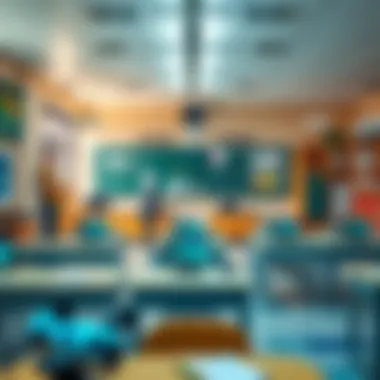
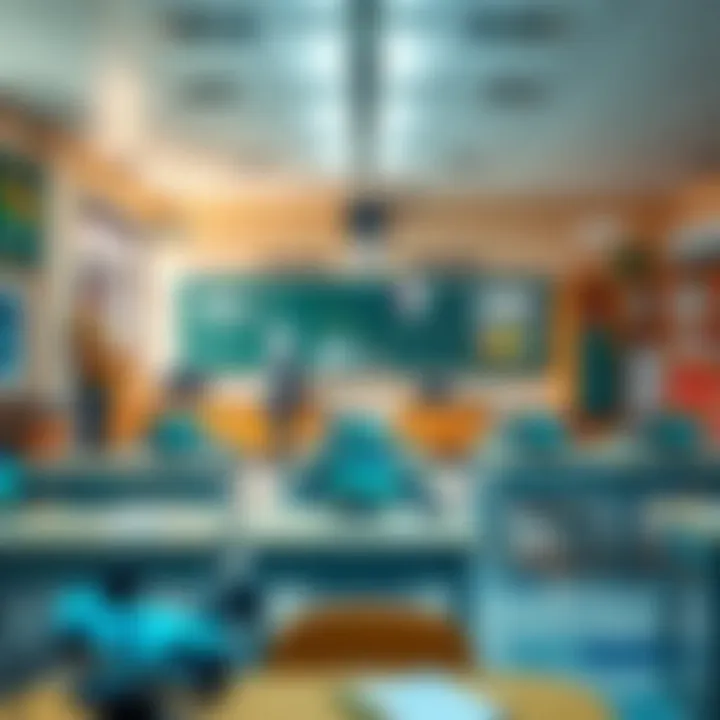
Intro
Dubai's educational landscape is as diverse as its population. As expatriates flock to this dynamic city, the importance of secondary schools becomes increasingly apparent. Families look for institutions that not only cater to academic excellence but also align with their cultural backgrounds and future aspirations. With a plethora of options available, navigating this educational maze can be a disorienting experience.
The secondary schools in Dubai offer a variety of curricular frameworks, including British, American, French, and the International Baccalaureate. Each curriculum holds its own distinctive advantages, catering to different educational philosophies and student needs. This article delves into the nuances of these schools, exploring market trends, investment opportunities, and the challenges facing educational stakeholders.
As we peel back the layers of Dubai’s educational system, we will also touch upon how these schools reflect the booming lifestyle and aspirations of expatriates. This comprehensive overview aims to inform families and investors about the secondary education ecosystem in Dubai, shedding light on what potential students can expect and how parents can make informed decisions.
Interestingly, while the focus often lies on academic performance, the holistic development facilitated by these schools plays a crucial role in preparing students for both local and global challenges. Equipping them with crucial life skills is just as significant as their grades; thus, a school’s ethos and extracurricular offerings deserve careful consideration.
In the sections that follow, we’ll explore market trends, investment strategies, and the future outlook of secondary education in this vibrant city.
Prolusion to Secondary Education in Dubai
Secondary education in Dubai represents a pivotal stage in the academic journey of students, shaping their futures and laying the groundwork for higher education and careers. This period, usually covering ages 11 to 18, is not merely about academics; it's about personal development, social skills, and preparing for life in a fast-paced global environment. Given Dubai's role as a cosmopolitan hub attracting expatriates from across the globe, the educational landscape is distinctive and multifaceted.
Understanding the Educational Landscape
Dubai is home to a myriad of secondary schools that cater to diverse cultures and backgrounds. The government has invested heavily in improving educational standards, emphasizing not just rote learning but also critical thinking, creativity, and skill acquisition. Schools in Dubai often have a blend of local and international curricula, making their offerings attractive to both expatriate families and local residents. Parents looking for quality education for their children have to navigate a vast array of options, ranging from public and private to international schools, each with its own educational philosophy and approach.
State-funded institutions offer a blend of local culture and modern teaching methods, while private and international schools provide globally recognized qualifications. Each school’s environment contributes uniquely to a student’s learning experience. For many families, this educational diversity is a blessing, but it also raises important considerations in terms of curriculum, school culture, and the overall educational philosophy.
The Significance of Secondary Education
The significance of secondary education in Dubai cannot be understated. It plays a critical role in shaping the intellectual and emotional maturity of adolescents. By providing a relevant and comprehensive education, students are better prepared for the demands of the modern workforce. As Dubai continues to evolve as a global city, there is a growing need for a skilled workforce that can meet the challenges of a competitive job market.
Moreover, secondary education is crucial for enabling students to pursue higher education, whether locally or abroad. With many universities worldwide recognizing qualifications from Dubai’s secondary schools, students have a broader horizon for their future. The impact of secondary education extends into various sectors, influencing not just individual lives but also the economic and social fabric of the city.
"A solid secondary education is like a sturdy bridge that leads students towards more advanced learning and eventual adulthood, providing tools that are essential for success."
Navigating this landscape effectively requires careful consideration of school choice, curriculum preferences, and economic implications. As the demand for quality education increases, so too does the competition among schools, which can work to the advantage of families seeking the best for their children. Understanding these nuances is critical for expatriates, investors, and policymakers involved in the educational ecosystem of Dubai.
Types of Secondary Schools in Dubai
When exploring the educational landscape of Dubai, the variety of secondary schools available is a key consideration. Understanding the types of secondary schools helps parents and stakeholders make informed choices about their children's education. Each school type comes with its own set of characteristics, benefits, and missed opportunities. This section outlines the major types of secondary schools found in the city: public schools, private schools, and international schools.
Public Schools
Public schools in Dubai serve as a fundamental part of the educational system. These schools are primarily funded by the government and cater to UAE nationals, although expatriates can sometimes enroll depending on availability and regulations. One significant advantage of public schools is their cost-effectiveness; tuition fees are generally lower compared to private and international institutions.
Students in public schools typically follow the UAE Ministry of Education curriculum, which offers a blend of cultural education and subjects like mathematics, science, and language arts, all while ensuring students also learn the Arabic language. For families navigating a budget, public schools present a solid option that doesn't sacrifice quality. However, parents often remark on the large class sizes, which can impact personalized attention for each student.
Private Schools
Private schools in Dubai are diverse, ranging from budget-friendly institutions to prestigious ones that charge significant tuition fees. They appeal mainly to expatriates, reflecting many different educational philosophies and curricula. The most common frameworks include British, American, Indian, and more, giving parents the chance to select a school that resonates with their cultural background and educational values.
A notable point is that private schools typically offer smaller class sizes and a higher student-to-teacher ratio, which tends to facilitate better student engagement. Extracurricular activities, often influenced by the school culture, promote a range of experiences from sports to arts. For expatriate families, private schools can greatly alleviate the transition into a new educational environment as they often align closely with Western teaching styles. Nevertheless, the costs can be a hurdle; tuition fees vary widely, sometimes leading to a heavy financial burden on families.
International Schools
International schools are designed primarily for expatriate families seeking an education system that aligns with their home countries. These institutions often offer internationally recognized curricula, such as the British GCSE or A-levels, the American system, or the International Baccalaureate (IB) program. This type of schooling is particularly beneficial for families who intend to move back to their home countries or for those seeking a globally recognized qualification.
What sets international schools apart is their distinct multicultural environment, where students from various countries and backgrounds come together. This diversity not only enriches the educational experience but also prepares students for a globalized world.
However, this does come at a cost, as international schools often have higher tuition fees compared to public and some private institutions. It can be a hefty investment, but for families looking for a more internationally minded education, the benefits might justify the expense.
In summary, each type of secondary school in Dubai has unique aspects worth considering. Parents should weigh the benefits alongside potential challenges, keeping in mind the specific needs and aspirations of their children as they embark on this educational journey.
"Choosing a secondary school in Dubai isn't just about academic excellence; it's about finding the right environment where a child can flourish."
By having a grip on what public, private, and international schools offer, parents and guardians can navigate their options to find a suitable match for their educational objectives.
Curriculum Frameworks Offered
When considering secondary education in Dubai, understanding the curriculum frameworks is vital. These frameworks shape the educational experience students receive, influencing everything from academic achievements to personal development. As the city hosts a melting pot of cultures, it’s crucial for schools to provide diverse educational pathways to cater to a broad range of students. This variety enables parents and students to select a school that aligns with their values, learning styles, and future aspirations.
British Curriculum
The British Curriculum is a popular choice among expatriates and locals alike in Dubai. Known for its structured framework, it emphasizes a broad education during secondary years, ultimately leading to GCSEs and A-levels.
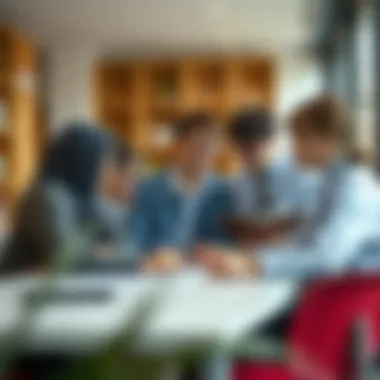

- Structured Approach: This curriculum is often seen as rigorous, requiring students to delve deeply into specific subjects. With courses available in fields such as the humanities, sciences, and arts, students can tailor their education to their interests and strengths.
- Accreditation: Many schools following this curriculum are accredited by the British educational authorities, ensuring standards are upheld.
- University Preparation: Completing A-levels prepares students for university education, particularly in the UK, offering a recognized pathway to higher education institutions worldwide.
Those considering the British system will find various schools offering the curriculum, each providing unique extracurricular activities and personal development programs to support students' growth.
American Curriculum
The American Curriculum is also a significant option in Dubai's education sector, known for its focus on liberal arts education. Its flexibility and broad subject offerings make it appealing for many families.
- Diverse Subject Matter: Students can choose from a wide range of courses, including advanced placement classes designed to challenge high-achieving students. This flexibility allows for a personalized education that can adapt to individual learning needs.
- GPA System: The grading system, based on grade point averages (GPA), provides a clear metric for academic performance, which is essential for college applications.
- College Preparation: This curriculum aligns well with admission processes for universities in the US, offering students cautious guidance for higher education pathways.
It's a common sight for American curriculum schools to offer extracurricular activities focusing on arts and sports, which foster well-rounded student experiences.
International Baccalaureate
The International Baccalaureate (IB) program is increasingly gaining traction in Dubai, revered for its holistic approach to education.
- Global Recognition: The IB is recognized around the world, making it a favorable choice for families considering international moves. This aspect enhances students' appeal to universities across different countries.
- Interdisciplinary Learning: The curriculum encourages critical thinking and intercultural understanding, preparing students for real-world challenges.
- Core Elements: With components like Theory of Knowledge (TOK) and the Extended Essay, the IB goes beyond rote learning, aiming to cultivate inquisitive minds ready to engage with complex ideas.
Families often find IB schools particularly enriching not just academically, but also in developing soft skills through various projects and community service opportunities.
Indian Curriculum
Dubai’s Indian Curriculum primarily follows the Central Board of Secondary Education (CBSE) system, which is tailored to the needs of Indian expatriates but is also appealing to other families.
- Strong Emphasis on STEM: With a focus on subjects like science and mathematics, this curriculum prepares students for competitive examinations in India and beyond, making it popular among families keen on returning to India for higher education.
- Cultural Relevance: The Indian Curriculum integrates local traditions and values, fostering a sense of belonging among the Indian community in Dubai.
- Value-Based Education: It often incorporates teachings around ethics and morality, aiming to create well-rounded individuals who contribute positively to society.
As many Indian schools in Dubai offer advanced coaching for national exams, families preferring this system find ample support and resources.
Each curriculum provides a distinctive approach to education, presenting various benefits and challenges. Parents and students should consider not only their immediate educational needs but also those that align with future aspirations in order to make the most informed school choice.
Key Considerations for Parents
Choosing the right secondary school for their child is a weighty decision for parents, especially in a diverse and dynamic place like Dubai. Education can shape a child's future, influencing not just academic success but also personal and social growth. In this section, we delve into vital considerations that parents should weigh before making this significant choice.
School Accreditation
Accreditation is a stamp of approval that showcases a school’s adherence to certain educational standards. It's one of the first things parents should check when evaluating a secondary school. In Dubai, numerous schools are accredited by reputable boards like the Council of International Schools or the British Schools Overseas. This certification can ensure that the school's curriculum and teaching methods are up to par.
By attending an accredited institution, students may have a smoother path to higher education internationally, as universities often favor applicants from recognized schools. Without proper accreditation, a school might cut corners, ultimately impacting students' learning experiences. Parents should also inquire about the school's inspection results from the Knowledge and Human Development Authority (KHDA) in Dubai, which assesses educational quality.
Class Sizes and Student-to-Teacher Ratios
Another critical factor in a child’s educational experience is the class size. Smaller classes typically allow for more tailored instruction, where teachers can actively engage each student. In Dubai, many schools strive for a balanced student-to-teacher ratio, often aiming for around 15 to 20 students per class. This setup not only fosters better communication and understanding but also promotes a more personalized learning atmosphere.
When the teacher can dedicate more time and attention, it enriches the educational journey. Parents might also want to consider how accessible teachers are outside of classroom hours, as this can impact a child's ability to seek help or support. Notably, schools that maintain lower ratios often report higher student satisfaction rates.
Extracurricular Activities
Beyond academics, extracurricular activities are integral to a well-rounded education. Schools in Dubai offer a variety of after-school programs, from sports and arts to academic clubs and community service projects. Engaging in these activities nurtures interests and talents while also enhancing social skills and teamwork.
Parents should look beyond just the availability of these programs; they should assess their quality too. Schools that invest in strong extracurricular offerings often see positive outcomes in student morale and academic performance. Participation in such activities can also provide students with vital skills that are increasingly valued in today’s job market.
To summarize, when considering schools for their children, parents need to take a close look at accreditation, class sizes, and extracurricular offerings. The choice of secondary school can hugely influence a child's future prospects, so it's crucial to weigh these factors thoughtfully.
"Education is the most powerful weapon which you can use to change the world." - Nelson Mandela
Before making a commitment, visiting and interacting with faculty and students can also provide invaluable insight, allowing parents to make informed decisions that best suit their children's needs.
For more specific information regarding educational standards in Dubai, you can visit KHDA or explore more on educational options on Wikipedia.
Trends in Secondary Education
Keeping an eye on the latest trends in secondary education is vital for understanding the evolving landscape of schools in Dubai. As the city continues to grow and incorporate a mix of cultures and technologies, the educational system adapts to meet the needs of its diverse body of students. The trends discussed here reveal fresh insights on how schools are preparing students for a rapidly changing world.
Technological Integration in the Classroom
The age of technology is upon us, and it has made a substantial impact on educational methods. In Dubai, schools are increasingly adopting digital tools and resources to enhance the learning experience. Smart boards, tablets, and interactive apps are becoming common sights in classrooms. This integration doesn't just make lessons more engaging; it also prepares students for a tech-savvy workforce.
- Benefits of Technological Integration:
- Enhances student engagement
- Facilitates personalized learning
- Prepares students for future careers
However, it's not without challenges. Teachers need training to effectively use new technologies, and there’s always the concern regarding the digital divide—that some students may have less access to technology at home.
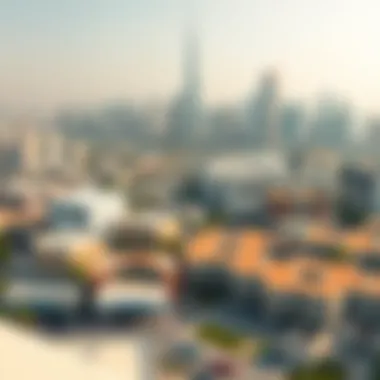

Focus on Mental Well-being
As competition in academics intensifies, the focus on mental health has gained momentum. Schools in Dubai are recognizing that education is not solely about grades or exams but also about the overall well-being of students. Programs focusing on mental health awareness, stress management, and counseling services are increasingly being instituted.
- Considerations for Schools:
- Implement mental health programs
- Offer counseling services
- Create environments that promote well-being
The integration of mental health initiatives within the curriculum helps in fostering resilience, emotional intelligence, and social skills. Schools are fostering a holistic approach, ensuring that students are not only academically versed but also well-rounded individuals.
Emphasis on Sustainable Education
The conversation around sustainability is taking center stage globally, and education is no exception. Dubai's schools are starting to weave sustainability into their curricula, teaching students about environmental responsibility and the importance of caring for our planet. This trend reflects not just a local, but a worldwide acknowledgment of green practices.
- Importance of Sustainable Education:
- Raises awareness on climate change
- Encourages eco-friendly practices
- Educates future generations on sustainability
Classes might include activities like community gardening, recycling programs, or eco-friendly projects that emphasize practical applications of sustainable living. By instilling a sense of environmental responsibility at an early age, schools can help shape a generation that values and actively participates in preserving the earth.
"Education is not the filling of a pail, but the lighting of a fire." - William Butler Yeats. This sentiment rings true as schools strive to inspire students in a rapidly changing world.
In summary, the trends in secondary education in Dubai reflect a broader shift towards integrating technology, mental well-being, and sustainability into learning environments. Understanding these trends is crucial for parents, educators, and policy-makers navigating the complex educational landscape.
Navigating School Choice
Choosing the right school for secondary education is not just a matter of academic reputation; it touches a multitude of factors that affect a child’s future. In Dubai, with its dynamic educational environment, parents face decisions that can be daunting yet pivotal for their children's development. This section aims to unravel the complexities of school choice in the city, highlighting the elements that make this task both significant and multifaceted.
Research and Visit Schools
When it comes to selecting a school, research is half the battle won. Parents are encouraged to take their time sifting through the myriad of options. With Dubai housing a range of educational institutions from public to international, knowledge is power. Websites like Knowledge and Human Development Authority (KHDA) offer valuable insights on school ratings and licenses.
Visiting schools can also paint a clearer picture. A firsthand experience can illuminate aspects that brochures might gloss over. Parents should consider asking the following questions during their visits:
- What is the school’s approach to student well-being?
- How engaged are teachers in the classroom?
- Are extracurricular activities varied and inclusive?
Understanding a school’s atmosphere can make a world of difference in ensuring a good fit for a child.
Understanding School Fees and Funding
Another significant facet of navigating school choice is grappling with the fee structures that vary widely between institutions. Parents need to be fully awakened to what each school demands in terms of tuition and additional costs, including uniforms, books, and extracurricular activities. Public schools generally offer free education, while private and international schools can charge exorbitant fees, sometimes reaching hundreds of thousands of dirhams yearly.
It's crucial to weigh this financial commitment against the potential return in terms of quality of education and personal growth that a student can gain. Many schools provide payment plans or financial aid, but it’s vital to thoroughly understand the terms right from the outset.
Speaking to Current Students and Parents
One of the most effective ways to gauge the pulse of a school is to talk to those directly involved—current students and parents. They can offer a wealth of insights, providing perspectives that formal school literature might overlook. Conversations about daily experiences can reveal not only the educational quality but also the culture and values upheld within the school.
Parents can take this a step further by attending school open days or community events, which also allows for informal interactions. Engaging with others in the educational community may unearth useful information about teacher-student relationships and ongoing support systems within the school.
Engaging in these conversations often clears the fog of uncertainty, enabling parents to make an informed choice based on real-world experiences rather than just external ratings or accolades.
"In the end, choosing a school isn’t merely a choice of curriculum but a choice for a child's future."
By weaving these elements together—researching, financially planning, and speaking with those in the know—parents can ensure that their school choice process is both comprehensive and beneficial for their child's educational journey in Dubai.
The Role of Language in Education
Language is a key element in the education framework of any nation, and Dubai is no exception to this rule. As a melting pot of cultures, the linguistic landscape in the UAE plays a critical role in shaping the educational experience for students. This section delves deep into the importance of language in secondary schools, exploring two prominent facets: Arabic language learning and multilingual education trends.
Arabic Language Learning
In the context of Dubai, Arabic is more than just a language; it is emblematic of the UAE's heritage and identity. As such, the incorporation of Arabic language learning within secondary schools is not merely a curricular requirement but also a cultural imperative. The presence of Arabic in the education system strengthens students' ties to their cultural roots, particularly for local Emirati students, while also fostering respect and understanding among expatriates.
Benefits of Arabic Language Learning
- Cultural Engagement: Students learning Arabic often find themselves more integrated into the local culture, enabling them to build relationships with locals and understand social nuances better.
- Career Opportunities: In an increasingly globalized world, proficiency in Arabic can open doors to various career paths, particularly in fields like international relations, business, and tourism.
- Cognitive Development: Learning a new language enhances cognitive abilities, improving problem-solving skills and creativity.
Challenges in Arabic Language Learning
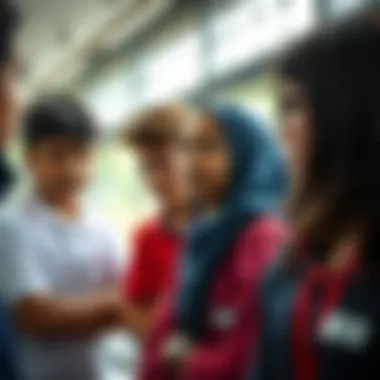
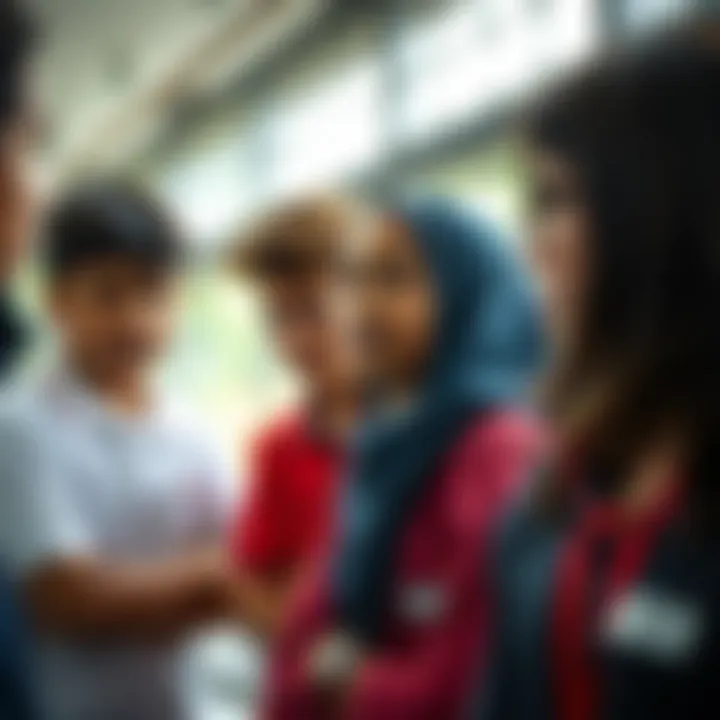
Learning Arabic can be a daunting task for expatriate students. The language has complex grammatical rules and a different script, which can pose an initial challenge. Schools often adopt innovative pedagogical methods to mitigate these challenges, including immersive experiences and the use of technology in language education, helping to bridge the gap for non-native speakers.
Multilingual Education Trends
Dubai’s diverse population necessitates a multilingual educational approach. Many secondary schools offer curricula that not only teach Arabic but also incorporate English and other languages such as French, Spanish, and Hindi. This multilingual trend reflects the city's cosmopolitan character and prepares students to thrive in a globalized world.
Importance of Multilingual Education
- Enhanced Communication Skills: Being multilingual strengthens communication capabilities, allowing students to navigate various cultures effectively.
- Cognitive Flexibility: Studies show that multilingual individuals possess better cognitive flexibility, making them adept at problem-solving and critical thinking.
- Global Citizenship: Multilingual education encourages a broader worldview, promoting empathy and understanding among diverse populations.
Implementation in Schools
Many institutions adopt a bilingual or multilingual model, where students learn in multiple languages simultaneously. This not only fosters linguistic proficiency but also intercultural learning, which is paramount in a multicultural society. Teachers often receive specialized training that equips them with the tools necessary to manage such a diverse linguistic classroom environment.
In summary, the role of language in education is pivotal in shaping both the academic and social experiences of students in Dubai. Understanding Arabic and embracing multilingual education trends are essential components in navigating the educational landscape of this vibrant city.
'The ability to communicate effectively in multiple languages is no longer a luxury but a necessity in today’s interconnected world.'
For further reading on this topic, check out resources like Wikipedia on Language Education or Britannica on Multilingualism.
Impact of Culture on Education
Cultural influences play a pivotal role in shaping educational practices and policies, particularly in a melting pot like Dubai. Here, where diverse populations thrive together, understanding the intersection of culture and education becomes essential. This section dives into how cultural factors not only shape the curriculum but also influence the learning environment, interactions, and educational objectives set by various schools.
Cultural Sensitivity in Curriculum
In Dubai's secondary schools, cultural sensitivity is paramount to providing a well-rounded education. This means that the curriculum must reflect the diverse backgrounds of the students while remaining respectful to the dominant Emirati culture. Schools often take great strides to incorporate elements from multiple cultures. For instance, literature classes might utilize texts from both Arabic authors and Western classic literature, ensuring that all students see themselves represented.
Moreover, the integration of local customs, traditions, and history creates a teaching environment that not only values diversity but also fosters a sense of belonging among students. Teachers are provided training on cultural competency, equipping them to handle a classroom where the lens of education must respect varied cultural norms. The aim is to create a safe space for students to share their experiences, enriching discussions and broadening perspectives.
Celebrating Diversity in Schools
Celebrating diversity goes beyond just having a multicultural curriculum; it presents an opportunity for schools to actively engage in cultural exchanges. Activities such as cultural days, where students share food, dress, and traditions from their home countries, are prevalent. These events foster friendships and understanding among students from different backgrounds and counteract stereotypes.
Additionally, schools in Dubai often host partnerships with local cultural organizations, inviting guest speakers or organizing workshops that highlight the richness of various cultures represented in the student body. These practices not only enhance social cohesion but also prepare students for a globalized world. Through such initiatives, schools gear students towards being not just learners but also culturally aware citizens.
In sum, the impact of culture on education in Dubai is multifaceted. Cultural sensitivity ensures that all students feel included, while celebrating diversity enhances communal bonds, preparing them for future challenges in a diverse society. By valuing both aspects, secondary schools in Dubai lay down a foundation that promotes mutual respect and understanding, vital components in any educational framework.
"Culturally responsive education is about enabling students to feel valued and understood, sparking a dedication to learning across diverse realms."
For more insights into cultural influences in education, consider visiting resources like Wikipedia, or exploring discussions on platforms like Reddit.
This clarity of purpose sits at the heart of Dubai's educational goals, paving the way for a classroom that thrives on relationship-building and collective growth.
Future Outlook for Secondary Schools in Dubai
The future of secondary schools in Dubai presents a landscape filled with promise and challenges. As the city continues to evolve and attract diverse populations, the educational sector must respond accordingly. While it might seem daunting, the adaptation and progress within the educational framework align with the city’s vision for growth and sustainability. This section will explore anticipated shifts in educational policies, alongside the role of technology, both of which are critical for shaping the educational experience in Dubai.
Predicted Changes in Educational Policies
The landscape of educational policy in Dubai is on the brink of transformation. Lawmakers and educational leaders are increasingly recognizing the necessity for policies that reflect the rapidly changing societal needs. For instance, there's a growing emphasis on inclusivity. This means that educational institutions will increasingly cater to a range of learning styles and abilities.
With Dubai’s demographic intricacies, one can expect tailored policies that support diverse cultural backgrounds and learning disabilities. Here are some predicted shifts:
- Increased Government Involvement: Expect corporations to partner with schools for curriculum development and internship programs.
- Focus on Critical Thinking and Innovation: The new policies are likely to prioritize critical thinking skills and creativity over rote learning.
- Sustainability Initiatives: Policies will stress the importance of environmental education. Schools will likely integrate sustainability into their syllabus, preparing students for real-world challenges.
Overall, these changes are likely to lead to a more adaptable and responsive education system that equips students with essential skills for a global marketplace.
Emerging Technology and Its Influence
In a world where technology evolves at lightning speed, educational institutions in Dubai are not standing on the sidelines. Instead, they are diving into the realm of digital transformation. The integration of technology in secondary education is likely to be one of the defining features moving forward. Here’s a glance at how technology is transforming the educational framework:
- Blended Learning Environments: Schools will adopt models that blend traditional face-to-face instruction with online learning, catering to different learning preferences.
- Smart Classrooms: Expect an increase in the use of innovative tech tools in classrooms. From interactive whiteboards to personalized learning software, technology becomes a significant part of the educational experience.
- Data-Driven Decision Making: Schools will increasingly leverage data analytics to inform teaching strategies, track student performance, and tailor educational activities.
The influence of technology is paving the way for more personalized, engaging, and effective teaching methods. In the long run, these advancements are expected to refine student outcomes.
In sum, the future of secondary education in Dubai is poised for a dynamic shift that aligns with global trends and local needs. By adapting educational policies and embracing emerging technologies, schools in Dubai will not only foster a more inclusive and stimulating learning environment but also equip students with the skills necessary for success in an ever-changing world.
The End
As we reach the final chapter of our exploration into secondary schools in Dubai, it is essential to underscore the vital themes discussed throughout this article. The education landscape in this vibrant city is as diverse as its population, presenting unique opportunities and challenges that are crucial for stakeholders to understand. Secondary education is not just a phase; it's a stepping-stone for students, shaping their future and, subsequently, the future of Dubai's economy and society.
Final Thoughts on Secondary Education
Secondary education in Dubai offers a rich tapestry of options, reflecting the cultural mix and forward-thinking ethos of the city. From public to private and international institutions, schools cater to a wide variety of academic needs and preferences. Parents, investors, and policymakers should take note of several key considerations as they navigate this landscape:
- Curriculum Diversity: The presence of multiple curricula allows families to choose an education path that best suits their child's educational preferences and future aspirations.
- Cultural Integration: Schools increasingly focus on integrating local culture, promoting bilingual education. This approach not only enhances language skills but also fosters a sense of belonging among expatriate students.
- Technological Adaptation: As we glance into the future, technology will undeniably continue to play a pivotal role in education. Schools that embrace innovative teaching methods are likely to provide students with skills necessary for the modern workforce.
- Focus on Holistic Development: It's significant to recognize that education extends beyond academics. Schools emphasizing mental well-being and character development enhance students' overall growth, preparing them for the complexities of life.



